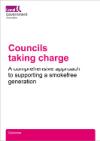
Introduction
Smoking is the biggest cause of preventable ill health and death in England. It causes around one in four cancer deaths and also plays a major role in conditions such as heart disease and stroke.
The cost to society is huge. It is estimated the total cost of smoking is more than £17 billion a year. This includes an annual £14 billion loss to productivity, through smoking-related lost earnings, unemployment and early death, as well as costs to the NHS and social care of £3 billion.
Most smokers know about the risks and want to quit, but the addictive nature of smoking means they struggle.
Reducing the number smoking remains a priority for both national and local government. The ambition is to achieve a Smokefree generation by 2030 – defined as fewer than 5 per cent of adults smoking.
At a national level the government has proposed phasing in a ban on the sale of tobacco products so no-one aged 14 now will ever be legally able to buy them.
But to help those who are already smoking the government is investing an extra £70 million per year for stop smoking services and support. This will more than double the current level of funding available to councils.
The hope is the money will further help innovation and expand the support that is on offer. Councils though are already showing what can be done as the case studies here demonstrate.
Local councils play a pivotal role in the fight against smoking by implementing a combination of policies, education, and support programs. Tackling smoking requires a comprehensive and collaborative effort, and through these initiatives, councils can contribute significantly to building healthier, smoke-free communities. By addressing smoking at the grassroots level, councils create a ripple effect that benefits both current and future generations.
Councillor David Fothergill
Chairman
LGA Community Wellbeing Board

